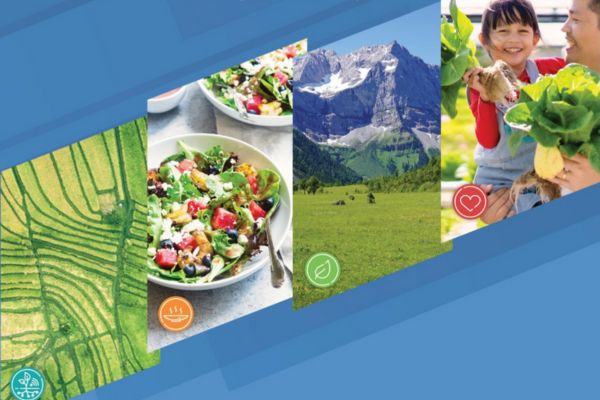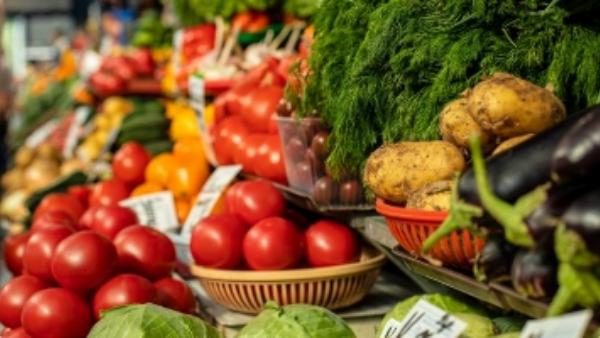Highlights
Director-General

News
FAO study reveals alarming agricultural land degradation in the Arab region
Two-thirds of the 70 million hectares affected by human-induced degradation — over 46 million hectares — are agricultural land

IN-DEPTH STORY
Investing in Jharkhand’s women
Support for Indian women farmers boosts economic empowerment, productivity and incomes.

Director-General launches food education partnership with the City of Rome to mark FAO’s 80th anniversary
The initiative was presented during an official ceremony hosted by the Mayor of Rome, Roberto Gualtieri

Interactive story
A hands-on look at food and agriculture
Using digital storytelling and data visualization our Interactives offer fascinating insights into the world of food and agriculture.

Campaign
365 days of action
Join FAO’s 80th anniversary by organizing events that highlight actions and innovations for a sustainable food future.

In Focus
FAO response to global food security challenges
Data analyses, policy recommendations, and actions on the ground.

Publication
A wealth of information
From specialized manuals to children’s books, FAO produces a vast range of informative publications. Explore a catalogue of FAO’s latest publications.

Interactive story
The Food Loss and Waste Challenge
How much do you know about food loss and waste? Put your knowledge to the test with our quiz!

In Focus
Unearth Sustainable Pompeii
Join us on a path to rediscover the innovative and sustainable practices of the past with this special educational experience.
Director-General

Director-General launches food education partnership with the City of Rome to mark FAO’s 80th anniversary
The initiative was presented during an official ceremony hosted by the Mayor of Rome, Roberto Gualtieri
Join the conversation
Voices of Impact
Boosting yields with hybrid rice: Robert's story
23/06/2025
Robert Sagula, a 69-year-old rice farmer from Nabiganda, Uganda, received expert training in transplanting techniques, proper digging, spacing between plants and fertilization, under the the FAO-China-Uganda South-South Cooperation (SSC) project. Part of the project involves the promotion of a high-yielding, drought-resistant hybrid rice variety created in China.
Video
Podcast
FAO Brief – 23 June 2025
23/06/2025
In this episode of the FAO Brief: conflict, disease and displacement drive hunger to catastrophic levels in parts of South Sudan; FAO released the most detailed report ever on marine fish stocks; and the UN recognizes three marine restoration projects in East Africa, Mexico and Spain as global models.
Data
Percentages of biologically sustainable and unsustainable fishery stocks by FAO major fishing area 2021
2020 World
31.2%
2010 World
31.5%
In depth

Data
Transparency is key to FAO’s mission
Our new transparency portal shows how and where our resources are used and the results we have achieved. Explore the portal now.

Publication
Medium Term Plan and Programme of Work
The Director-General’s Medium Term Plan 2026-29 and Programme of Work and Budget 2026-27.

In Focus
FAO Data Lab
The FAO Data Lab for Statistical Innovation modernizes the statistical business process, with a specific focus on emergency contexts, when having access to timely information is very important.
FAO and the SDGs
Hover the mouse over an SDG icon for more information
A world free from hunger and malnutrition where food and agriculture contributes to improving the living standards of all

FAO works with governments and partners to empower some of the world’s most marginalized people to end rural poverty.

FAO helps ensure food security by developing ways of growing food that will work in the future so that millions of people don’t go hungry.

Good health starts with nutrition. FAO sets global standards and works with governments and the private sector to ensure food quality and safety throughout the food chain.

FAO invests in educational systems for rural communities and supports improved access to primary education and school meals in order to create equal opportunities for all and chances of lifelong learning.

FAO supports gender equality in the agricultural sector in an effort to raise levels of nutrition in local communities and improve agricultural productivity.

FAO works with governments to ensure water use in agriculture is made more efficient, equitable and environmentally friendly.

FAO promotes the use of renewable energies and works to ensure access to modern energy services across the food chain.

FAO seeks better economic opportunities for all by investing in sustainable agricultural practices and food systems that reduce inequalities and create decent jobs.

FAO seeks to secure a future for rural communities via investments in transportation, irrigation, food storage facilities and communication technologies.

FAO works with countries and partners to generate employment in rural areas, ensure access to natural resources for the most vulnerable and connect farmers to markets.

FAO works to improve urban healthcare, water quality and rethink city region food systems to help deter the negative effects of sprawling urbanisation.

FAO coordinates major global initiatives and projects to tackle food waste and loss, partnering with international organisations, the private sector and civil society.

FAO supports countries in responding to the threats of climate change by providing advice, data and tools for better agricultural policies and practices.

FAO, in partnership with governments and fishing communities, implements best practices in fisheries to ensure our oceans are protected as a means of livelihoods.

FAO promotes sustainable approaches to natural resource management and supports endeavours that promote a balance between conservation and development initiatives.

FAO plays a critical role in peacebuilding, restoring rural livelihoods, building resilience and participatory approaches to policymaking.

FAO acts as a neutral policymaking forum and develops partnerships with all concerned with food and agriculture to ensure a world free from hunger.


















Globally Important Agricultural Heritage Systems.
FAO BLOG
Saving the ocean without excluding people
When science, governance, and cooperation work together



